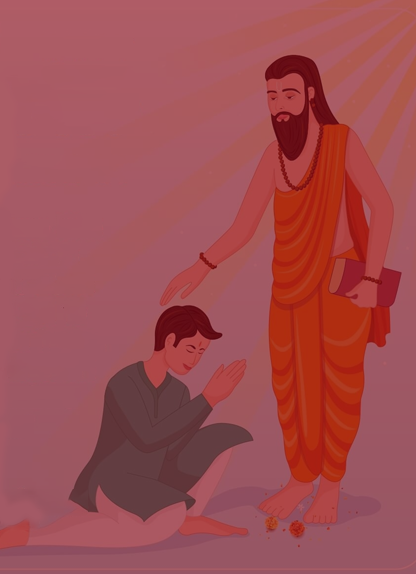Arjuna said: Chapter VI-33. I do not see the steady continuance of the Yoga of sameness that you spoke of because of (mental) restlessness.
We all as seekers on the path need God's help in steadying the mind. As we watch it, instead of the promised bliss and unity, our practice shows our desires, plans, and mind-games. The mind is more difficult to control than the wind as it goes hither and you. According to Swami Sivananda, it is also "turbulent, strong and obstinate."
The Blessed Lord said: Chapter VI-36. It is my opinion that Yoga is hard to attain by one with an uncontrolled self, but the self-controlled and striving one can obtain it by proper means.
Abyasa (practice) is the first measure. One must find an idea of God, image of God, or the same thought or image of the Self and repeatedly bring the mind back to this point. The next measure is Vairagya (dispassion) to all objects of the senses or Sankalpas (goals) by looking into their evil. The sweetness of the bliss of unity should be remembered. The ability to achieve one-pointed of the mind will often slowly; progressively it can be controlled. Each minute is a new start.
Arjuna said: Chapter VI-37. What is the fate of one who has faith, but is not diligent, whose mind has fallen away from Yoga, therefore failing to achieve perfection in Yoga?
Success in Yoga involves the determination and firmness to achieve and keep the one-pointed memory of the Harmony in God alive. All seekers worry about somehow losing their focus; possibly even at the time of death when a desire might enter the mind. Only connection with a Teacher, the profound quiet of the Inner voice or the energizing encouragement of a Master can help allay the doubts that all spiritual aspirations, may in the end be for naught.
The Blessed Lord said: Chapter VI-41. Having obtained the worlds of the righteous, dwelling there for unlimited years, one who fell from Yoga will be borne in the house of the pure and wealthy.
According to the belief in reincarnation, until one achieves eternal peace and harmony, one is fated to be born again and again. The conditions of this rebirth are based on the actions in previous life. The birth in a house of the pure and wealthy gives the soul the best opportunity to continue towards realization. In saying this, the Lord assures Arjuna that there is no destruction for one who does good deeds, such a person will never come to the grief of a lower birth.
Chapter VI-28. Always concentrating his mind in the Self, the Yogi, freed from sin, easily enjoys the infinite bliss that comes from contact with the Eternal.
Our sources of unhappiness are thoughts about what we don't possess, whether it be material or psychological like attention, power, success, etc. If the bedrock of the mind is a steady stream of concentration on the Self, the Eternal Divine experienced within, then how can there is anything but bliss from the ineffable That. The root of sin is desire. When the mind is concentrated in the Self there is no space for Desire.
Chapter VI-42. Or one may even be born into a family of wise Yogis; such a birth is hard to come to in the world.
This is an even more favorable example of the beneficent possibilities for one who strives for perfection. In such a birth, the person easily comes in contact with the knowledge acquired in the former body. These preformed mental pathways set the stage for an even more vigorous aspiration than in the previous birth.
Chapter VI-44. By the former practice, verily one is born along helplessly. Even one who wishes to know Yoga goes beyond the note study of scripture.
The aspirant, who desires to Know God, is helped through that persistent dedication by grace, unknown to people who blindly follow by rote the laws of scripture. More than by obedience to the Word God is moved by Unceasing Love and Remembrance.

